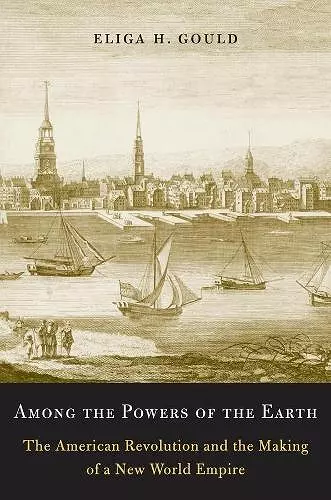Among the Powers of the Earth
The American Revolution and the Making of a New World Empire
Format:Paperback
Publisher:Harvard University Press
Published:1st Sep '14
Currently unavailable, and unfortunately no date known when it will be back

For most Americans, the Revolution’s main achievement is summed up by the phrase “life, liberty, and the pursuit of happiness.” Yet far from a straightforward attempt to be free of Old World laws and customs, the American founding was also a bid for inclusion in the community of nations as it existed in 1776. America aspired to diplomatic recognition under international law and the authority to become a colonizing power itself.
As Eliga Gould shows in this reappraisal of American history, the Revolution was an international transformation of the first importance. To conform to the public law of Europe’s imperial powers, Americans crafted a union nearly as centralized as the one they had overthrown, endured taxes heavier than any they had faced as British colonists, and remained entangled with European Atlantic empires long after the Revolution ended.
No factor weighed more heavily on Americans than the legally plural Atlantic where they hoped to build their empire. Gould follows the region’s transfiguration from a fluid periphery with its own rules and norms to a place where people of all descriptions were expected to abide by the laws of Western Europe—“civilized” laws that precluded neither slavery nor the dispossession of Native Americans.
[Gould’s] shrewd analysis offers a valuable perspective on American history during a formative era… Scholars of European history have long argued for the primacy of foreign affairs in driving state formation and shaping politics. But American observers—scholars and generalists alike—have rarely applied this idea to the history of their own country before 1900. America in its formative stages is usually viewed apart from the international system—as a promised land separated from the rest of the world by two oceans and shaped by its own lofty ideals. But in fact, as Gould shows, America came into its own only by claiming full membership in the community of nations. Gould is right to give greater attention to this neglected theme in American history. -- William Anthony Hay * Wall Street Journal *
Gould’s brilliant analysis ranges chronologically beginning in the mid-1750s, moving through the American Revolution and terminating with Monroe’s Doctrine of 1823, which firmly expressed U.S. sovereignty and announced the country’s position at the ‘head of a new hemispheric community of nations.’ The uniqueness of Gould’s argument is his extended examination of how the avoidance of war increased the sustainability of the U.S. as a ‘slaveholding republic.’ -- B. C. Odom * Choice *
A subtle, complex, and persuasive book. The breadth of Gould’s vision is impressive, combining diplomatic, legal, and intellectual history in order to examine the emergence of the United States alongside the states and empires of Europe. Among the Powers of the Earth makes a notable and original contribution to our understanding of the American Revolution, the British Empire, the history of slavery and anti-slavery, and international relations. It will become a landmark in the field. -- Frank Cogliano, University of Edinburgh
No nation is an island, not least the United States. This innovative book recasts the American Revolution by revealing the international forces that shaped its course. The United States, Gould demonstrates, was ‘an entangled nation,’ one whose survival hinged on its ability to join the international community. This new position came at a price for slaves and Amerindians, who languished on the margins of the young nation as stateless people. It is a powerful story, persuasively told in this imaginative and wide-ranging work. After reading Gould’s erudite and compelling study, no one will look at the American Revolution or the new nation in the same way. -- Alison Games, Georgetown University
Offers a fresh and provocative point of departure for understanding our national history. Simultaneously building on and rejecting British imperial efforts to extend law and civility in America and the world, Revolutionary Patriots struggled to secure independence and consolidate their own imperial claims by making the new nation ‘treaty-worthy.’ Gould shows that American nation-making was shaped by unpredictable developments in the dynamic and dangerous world Revolutionaries sought to join, on terms set and shaped by other nations and peoples. This is much more than a history of early American foreign relations; national history and world history—nation-making and world-making—are, as Gould brilliantly demonstrates, inextricably linked. Gracefully written and persuasively argued, Among the Powers of the Earth is a major contribution to American historical scholarship. -- Peter S. Onuf, University of Virginia
- Joint winner of SHEAR Book Prizes 2012
- Short-listed for George Washington Book Prize 2013
- Nominated for Ray Allen Billington Prize 2013
- Nominated for Littleton-Griswold Prize 2012
- Nominated for Francis Parkman Prize 2013
ISBN: 9780674416949
Dimensions: unknown
Weight: unknown
344 pages